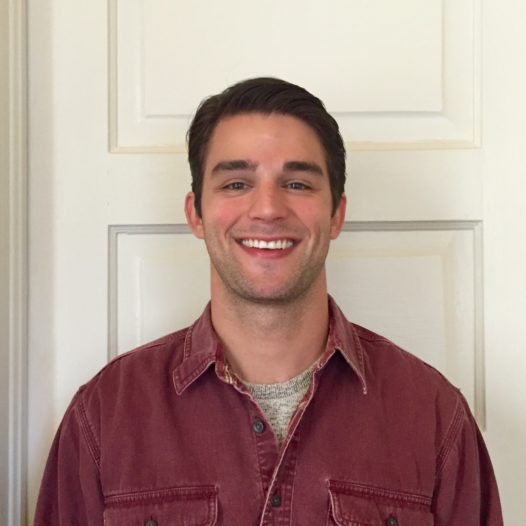Act out your inspiration: Existentialism in New Orleans
By: Alex B. Johnson

Alex B. Johnson (photo by: Caroline Johnson)
New Orleans is a city of existentialists. Not simply because hurricanes and rising sea levels imperil its existence, but also because its artists remind us to get up and act out our impulses.
At Faulkner House Books in the French Quarter, Sarah Bakewell’s At the Existentialist Cafe: Freedom, Being, and Apricot Cocktails remains a bestseller a full year after its release. “I enjoyed the characters,” bookshop owner Joe DeSalvo says. As for the philosophy, however, “I lived through all that.”
Being an “existentialist” was so common a phrase that, according to Bakewell, it “was used as shorthand for anyone who practiced free love and stayed up late dancing to jazz music.” Bakewell synthesizes the philosophies of all the modern existentialists, but to carry the narrative she focuses on the open relationship between Jean-Paul Sartre and Simone de Beauvoir, how their discussions on freedom and being have influenced every aspect of modern life without most of us noticing it.
Existentialism is about action. One is what one does. It’s also about choices, about the freedom to create consequences by freely deciding who we are at every minute. Our decisions amount to actions and, in time, who we are. Existentialism means a person is free to create one’s own essence, that one’s character is not bound by any predestination.
Awareness of the importance each day holds is something many New Orleanians share.
Local artist Ashley Longshore reminds her 62,500 Instagram followers to live life more abundantly. Fun is her motive, whether she’s dancing with the butterflies around Frida’s painted face or bejazzling Abe Lincoln’s beard.
Alynda Segarra of Hurray for the Riff Raff wrote her new record, The Navigator, to inspire young women to act out their dreams. She ran away from home in New York at 17, and after train hopping across the country like Woody Guthrie, she found her home in New Orleans’ music community. “New Orleans taught me about joy and about living on my own terms.” Her world tour homecoming was on May 5 at the Civic Theatre.
When NOMA inaugurated its new exhibit on Jim Steg, the internationally renowned but local printmaker and sculptor, the museum hosted a lecture on innovation and existentialism. And one need only review Wendell Pierce’s career trajectory–from Ben Franklin High School to HBO, from stage actor to grocery store owner and author–that he values his art and uses it for good.
But it was Walker Percy’s National Book Award-winning novel, The Moviegoer, that gave New Orleans its favorite existentialist, Binx Boling. An almost 30-year-old war veteran-turned-stockbroker, Binx wanders around in “the malaise” of the ordinary everyday. He fears being a nobody nowhere but he finds happiness in “the search.”
Binx sounds a little like local filmmaker, Shane McGoey of Old Quarter Films, who found his happiness during his own search by satirizing the New Orleans film scene at Second Line Stages off Tchoupitoulas. People, already a best-selling pre-order on iTunes, is also set for worldwide release on Google and Amazon on May 1. McGoey based the six-chapter story on the structure of Jean-Paul Sartre’s No Exit and ideas from Being & Nothingness.
As JazzFest inspires both locals and visitors to get up and join the music, the New Orleans spirit inspires action for living up to the moment. Remember these artists who remind us–whatever one’s individual talent may be–to act on the impulse. Your essence depends on it.
Alex is an author, bookseller, and attorney in New Orleans whose novel-in-progress was a top-ten finalist in the 2016 Faulkner-Wisdom Competition. Alex grew up on a farm in north Georgia, worked for U.S. Sen. Mary Landrieu on Capitol Hill, and worked at Faulkner House Books while studying at Tulane Law. A member of Peauxdunque Writers Alliance, Alex’s fiction, poetry, nonfiction essays, interviews, and music and book reviews have been published in various literary and law journals, regional newspapers, and music magazines. He has a forthcoming feature story in The Bitter Southerner about Congressman John Lewis’s National Book Award-winning trilogy, MARCH.
 NOLAbeings Multimedia artist Claire Bangser created NOLAbeings as a portrait-based story project that marries...
NOLAbeings Multimedia artist Claire Bangser created NOLAbeings as a portrait-based story project that marries...  Voodoo in New Orleans: Reviving history: New Orleans fortune telling This article takes a deep dive into the history of Voodoo in New Orleans, its hybridization with Catholicism, and its present-day place in the city's culture. The author visits fortune-tellers in the French Quarter, using their guidance as a tool for introspection rather than a deterministic predictor of the future. Through her experiences in New Orleans, the author feels a mystical connection to both the past and the future.
Voodoo in New Orleans: Reviving history: New Orleans fortune telling This article takes a deep dive into the history of Voodoo in New Orleans, its hybridization with Catholicism, and its present-day place in the city's culture. The author visits fortune-tellers in the French Quarter, using their guidance as a tool for introspection rather than a deterministic predictor of the future. Through her experiences in New Orleans, the author feels a mystical connection to both the past and the future. 